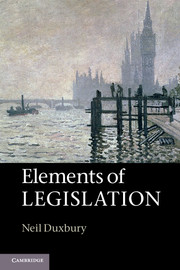1 - Introduction
Published online by Cambridge University Press: 05 December 2012
Summary
To legislate on a matter is to take action which is intended to regulate that matter in some way. This is not to claim that regulation is the only intention behind a legislative initiative. The intention to regulate is, nevertheless, the intention that distinguishes an action as legislative. Other reasons for legislating could be to clarify, consolidate, pronounce authoritatively on or preclude the need for further debate – or possibly (in exceptional instances) even to provoke debate – about a matter. But one could seek to clarify, consolidate, pronounce authoritatively on or preclude or provoke further debate without legislating. Essential to the act of legislation is the intention that it has some kind of controlling or enabling effect – that, from the point at which the legislation takes effect, some aspect of the world should (which is not to say that it will) be treated as governed in a particular way.
In everyday speech, we do not assume legislating to be an exclusively juridical activity: the proposition that poets are the world’s unacknowledged legislators, for example, expresses the belief that poetry shapes human thought and conduct, while the claim that there is no legislating for a particular human prejudice or disposition is to assert that this prejudice or disposition is beyond influence. By and large, however, legislating is a juridical activity – law making – and it is on juridical legislation that this book concentrates.
- Type
- Chapter
- Information
- Elements of Legislation , pp. 3 - 25Publisher: Cambridge University PressPrint publication year: 2012
References
- 1
- Cited by



